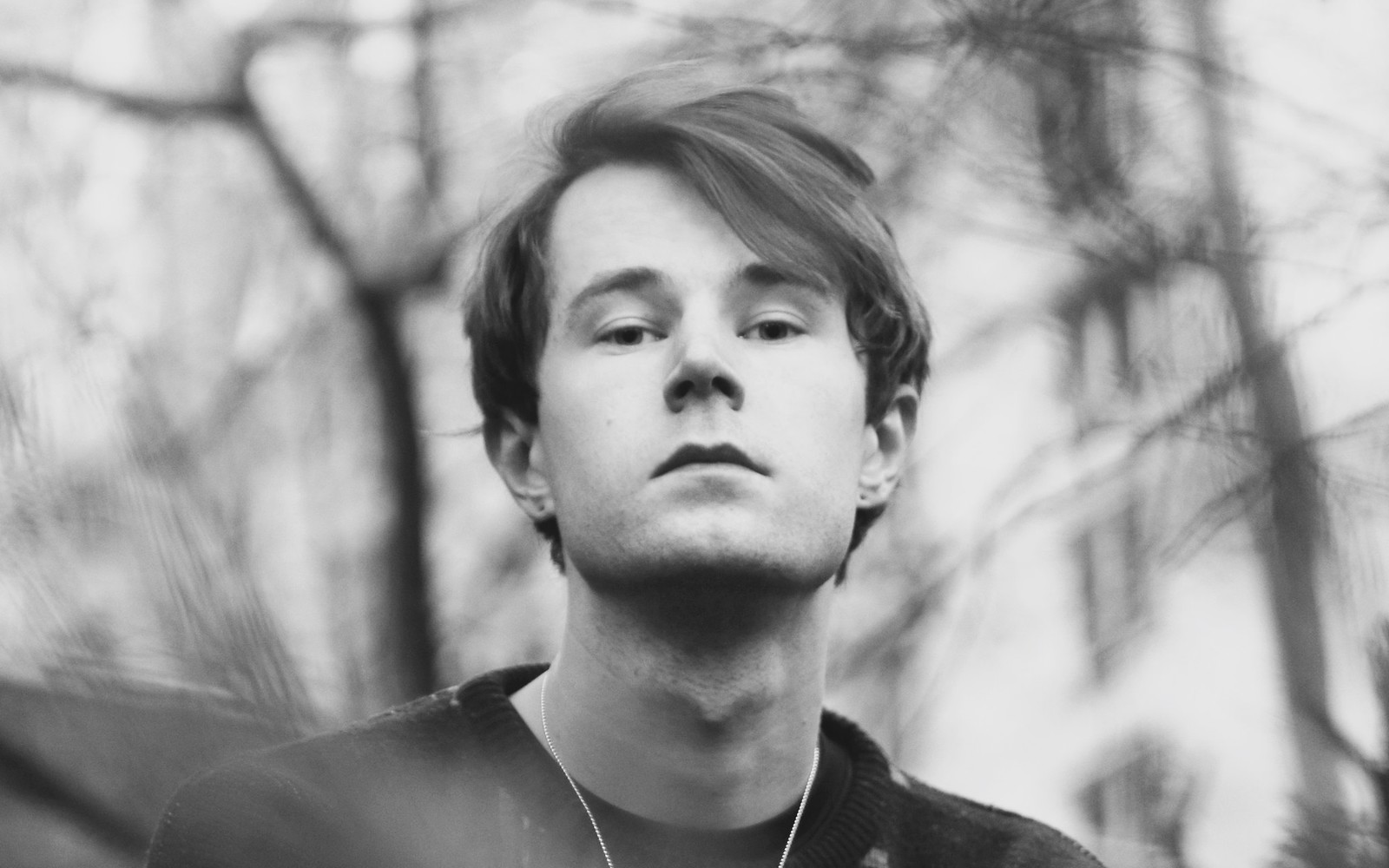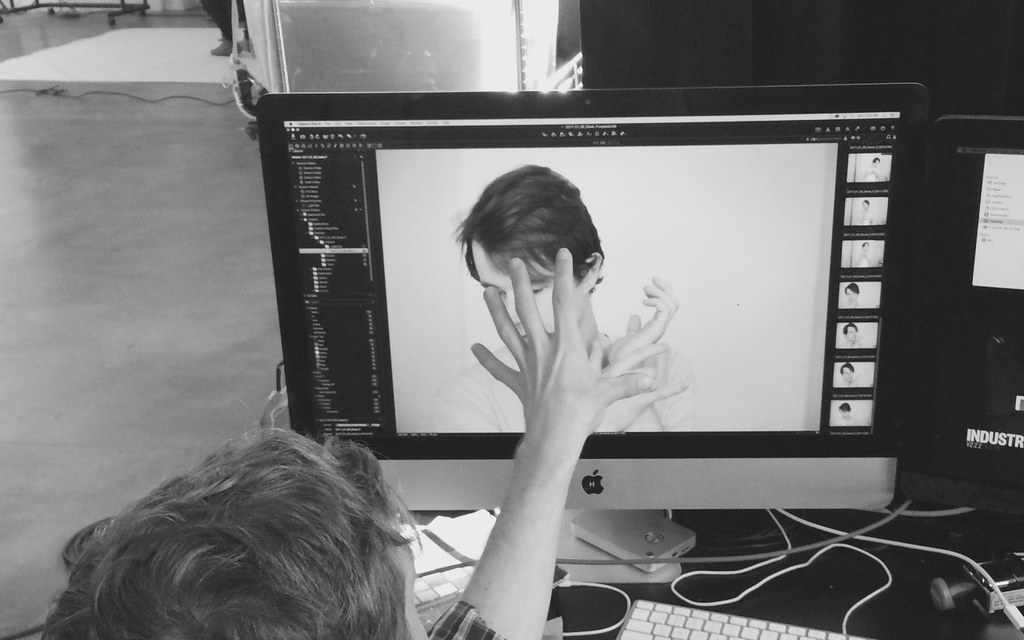Forest People Pop // Derek Piotr

Photo by Josh Lobel
Over six years and six full length albums, Derek Piotr's music has sustained a firm resistance against all satisfactory classification. On the one hand, he is a laptop sound designer, obsessed by technical minutiae of production trickery. On the other, he is a pure-at-heart singer, a folk musician in the most traditional sense. Back in 2013, we were treated to a mix from Piotr. We expected noise, field recordings and glitch. We got M.I.A, Omar Souleyman and Forest Swords. And after years of pushing his vocals into groundbreaking new territory, he released Drono, a record containing no discernible vocal performances whatsoever.
So what, if anything, can define Piotr's sound? Are we in any capacity to pluck out the heart of its mystery? There is no single make-or-break factor that all of his music seems to share. Instead, there is a network of similarities, criss-crossing and cross-referencing one another. I couldn't list the go-to features of Piotr's expansive discography, but I know it when I hear it. Piotr's upcoming record, 'Forest People Pop', displaced his sound once again, from the murky shallows of drone to the glowing alter of pop. Albeit, radio-unfriendly pop. In light of this new release, we caught up with Piotr to talk Trump, Snowden and Missy Elliott.
Last year you released Drono, a record with a marked departure from the microphone. Can you tell us a little bit about the making of that album and your feelings towards singing at the moment?
I always wanted to make drone for myself because I am fascinated by it. But I also knew that Drono would speak to a certain demographic of experimental music fans who would otherwise hate my work. I know my singing bothers some people, just as Joanna Newsom’s singing bothers some people or Bob Dylan, or Conor Oberst… voices are just naturally polarising. But a lot of experimental music fans are still stuck in the 90s, where vocals were used only sparingly in electronic music. You could get cut-up Destiny’s Child vocals or just a ‘hey’ or a ‘woah’ sound. But it was a bit taboo to have a vocal performance over your beats. My next record is going in the complete opposite direction: a shiny, complex pop record.
Can you tell us a little bit about this new record?
I have been listening to more and more acoustic music. I feel to some extent as if I should be an acoustic musician, but I’m not very good at playing acoustic instruments… and I have problems sonically with guitars and pianos and so on. I’m not really a performance-based musician. My strength is in studio editing. But I still love the sensation that you are listening to a performance rather than something programmed.
If you listen to too many ‘producers’ you can get tunnel vision on their studio trickery and lose sight of the music. It’s weird — in the visual arts if you were to copy something, people would tell you that it’s wrong or that you shouldn’t do that. But if you copy a groove or beat or the way a hi-hat sounds, then people say how cool it is to flip that vibe — you know what I mean?
I know your vocals are heavily processed with auto-tune and other effects. But isn’t it your singing that gives your music that acoustic element?
Yeah — part of the reason I like using vocals is because you can braid the acoustic and the electronic together. I think this is why people like pop music. It can be very processed and manicured but there’s still a human inside there, ultimately. I’ve been a vocalist since I was a child so it’s really the only instrument that I can perform well.
I think that the processing on your vocals is part of what makes your stuff unique. From where do you draw influence for those weird modal scales?
Well I listen to a lot of Egyptian electro chaabi music and Raï music which are both ceremonial. There’s this great performer called Hafida who uses this strange auto-tune effect on her karaoke machine. I find it really interesting when you have these flattened modes set on the auto-tune and when you move to the boundaries of notes, you get this chromatic effect that the computer doesn’t really know what to do with.

You once said that working with Meredith Monk in the past taught you the realisation that, “Words do not matter”. But this new album seems to contain some really intense lyrical content.
Yeah — I still think that words do not matter to music. But this new album is meant to be a pop record, right? It’s not a typical pop record, it is deeply strangely shaped, I understand that. But in order to anchor this record as pop music, I needed love songs, verse-chorus structures and all that. I think there is an unwritten pact between you and the universe when you make art that the more you give out of yourself, the further the work can sail through the world. So I felt as though I should address topics that I have never sung about before: songs about love, pain, whatever.
There’s even a rap from Banx about climate change, right?
Yeah — I feel like since all my records have hitherto avoided touching upon politics, I have earned the right to make reference to something like Trump or whatever. I also hope that a lot of people find humour in my music. I love absurdity in music. Missy Elliot is a genius, and part of how she achieves that is through making all these absurd and humourous noises with her mouth. I wanted to push the humour a bit with this record. A lot of people say my music is dark but I disagree.
I feel like Drono was a very dark record, if only in comparison to Bahar.
Really? I see it as totally uplifting and luminous music. Then again, a lot of my music is optimistically melancholic. That feeling where you are kind of distraught by life, where you are freaked out by the mundanity of everything, but you are nonetheless channeling this light energy, where you feel possessed by this connection with the world despite everything. St Vincent captures that feeling really well too, I think.
So back to your new record. What is ‘Forest People Pop’? A genre?
I find the idea of starting a ‘forest people pop’ movement funny. Or as a hashtag or something. I like to think of it as a genre too. A lot of electronic music at the moments seems to be really tense, clean and squeaky. I don’t want to name names but it’s as if everyone wants to be Holly Herndon all of a sudden. My intent with this record was to use some of that style but in a way that is more earthy, more wooly, more splintered… As if you were watching an Edward Snowden live-stream from a bamboo hut.
Why is it that you want to distance yourself from that music?
I wanted this record to be like a second child — one who wears hand-me-downs and has uncombed hair and doesn’t care so much about being late for school. In the last two or three years there has been a lot of hyper-squeaky, urban, dark, zeitgeist-y, aggressive, impressive hybrid music. There are so many producers we could name here. My immediate reaction to that stuff was that it was disgusting. But as I’ve lived with some of it, I’ve come to realise that it’s just not ‘lived in’ enough.
For example, take ‘lemonade’ by SOPHIE. It’s the kind of thing that’s very meme-able and the first time I heard it I thought, ‘oh my god I need to send this to at least 15 people, this is some crazy shit…’ But after a few listens you realise that it’s too much. It’s over the top. Whereas when I listen to Radiohead, I initially think it’s fucking boring, but 10 listens later and I’m in love. So it’s a tradeoff. You either have music that is immediately satisfying that wears you out, or something that is mysterious at first but becomes your best friend. It’s really hard to find both, but that’s what I tried to do with my new record.
There must be a strange atmosphere in the US right now with Trump inauguration coming up. Some have been saying, perhaps erroneously, that it will trigger a new wave of angry, political art. What do you think?
I’m always a little wary about joining political movements just because I think they tend to create a division between people. Like if you’re not in camp A, then you must be in camp B. I think that attitude is really dangerous for me. But my new year’s resolution is to be more expressive and more compassionate. I think everyone that I know is queer to some degree. I don’t mean that I have a circle of queer friends, but every person in every walk of life that I know has some expressiveness about themselves or some queerness that they recognise. I don’t necessarily mean queer as in a sexual preference but there’s something revolutionary in the way they think.
In the states right now, it feels very ‘now or never’. If I don’t speak up and make an effort to fill someone’s eye with flowers in my day to day life, then I am guilty somehow. The day after Trump got in, people were literally crying in New York. The subway was completely dead. Everyone was totally flabbergasted and horrified. So I feel like I need to do my part to be more expressive and more involved in the way the climate is, try to offer some sort of beauty to address this. You’ll probably never see me at a rally but I just want to colour the air with awareness and defiance.
- Published
- Jan 19, 2017
- Credits
- Words by Georgie_McVicar
